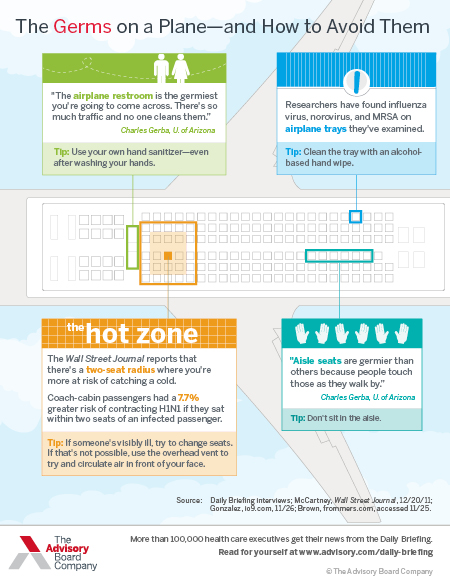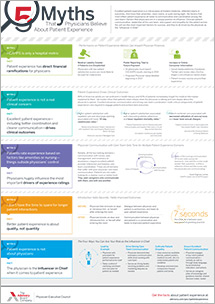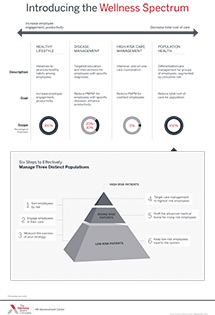Auto logout in seconds.
Continue LogoutEditor's note: This popular story from the Daily Briefing's archives was republished on Sep. 2, 2021.
By Jackie Kimmell, Senior Analyst
Have you ever shared an amazing-sounding "fact" about health or the human body, only to be embarrassed later when you learn that that fact was either unsupported or wrong?
Reality check: 4 myths revealed about your patient access strategy
It's not your fault. Given the number of medical studies coming out every day—many of which may contradict each other—it can be hard to separate fact from myth, even for those of us who work in health care professionally. But believing myths can lead to social embarrassment and, worse, can adversely impact the health of you or your patients.
To help, we've dug into four of the most common health myths and brought you the science behind them. (And remember, even if you don't believe these myths, your patients probably do!)
- Going out in the cold makes you sick (especially if your hair is wet).
Despite what your mother said, the only way to catch a cold is to actually get infected by a virus—being out in the cold will not get you sick on its own. The reason many people associate cold weather with sickness is because many viruses spread primarily in the winter months.
So even if cold weather doesn't cause a cold, does it at least make you more vulnerable to cold viruses? Many large studies have shown no impact. A 1958 study in which researchers put participants in a 10-degree, 60-degree, or 80-degree room and inoculated them with a virus found no differences in the number of people who got infected.
In another study, done in 1968, prisoners in Texas penitentiaries were exposed to 40-degree temperatures at different intervals before, during, and after being exposed to a virus. Researchers in in that study also found no difference in how many people became infected, how they reacted if infected, or how they recovered.
So why do so many more people get sick when it's cold out?
“So why do so many more people get sick when it's cold out? It's possible that it's actually due to spending more time indoors”
It's possible that it's actually due to spending more time indoors. Since we tend to run central heating in the winter, rooms tend to become drier. There's some evidence that low-humidity environments might improve transmission of the flu. In high-humidity environments, influenza particles tend to attach to water molecules that dissipate from the air, while in a low-humidity environments, they're more likely to float around long enough to find a human victim.
Viruses might also be more able to survive in the winter. Some NIH research has shown that virus' protective coatings might be more durable in cold weather, but melt more easily in hot weather.
- Eating carrots will help you see better in the dark.
Like many myths, this one contains a kernel of truth: Carrots contain high levels of beta-carotene, which your body needs to create vitamin A—and you need vitamin A to see. The cornea of the eye (the transparent front layer of the eye) can actually disappear without enough vitamin A, and each year, 250,000-500,000 children go blind as a result of a vitamin A deficiency.
However, for most Americans with a normal food intake, eating carrots doesn't make any difference in eyesight. Once the body has enough vitamin A, the body stops converting beta-carotene in order to prevent the body from accumulating it in toxic levels. Therefore, once you reach a normal level, extra carrots stops making a difference.
“Eating too many of them does actually turn the skin slightly orange.”
So how did this myth get started? It apparently comes from reports issued by the U.K. Ministry of Food that eating many carrots allowed British Royal Air Force personnel to see better and gun down German aircraft at night during World War II. The agency also conducted a propaganda campaign to urge the British public to eat more carrots so they could see at night during blackouts. However, after the war, rumors swirled that the carrot campaign was actually a cover-up to prevent Germans from discovering the real reason that British fighters could suddenly identify enemies so much better: the then-new technology of radar.
One interesting fact about carrots is true, however: Eating too many of them does actually turn the skin slightly orange.
- You need to drink 8 glasses of water a day—or else.
The origin of this myth might be a 1945 article from the U.S. National Research Council which noted that a "suitable allowance" of water is 2.5 liters (or around ten glasses) a day. This figure was later extrapolated to the recommendation of eight daily glasses for Americans of normal body weight. However, this recommendation overlooked the Council's next sentence—which noted that an adequate amount of water usually comes from our dietary intake, which includes many foods and beverages aside from pure water.
Indeed, most existing studies show that an adequate daily fluid intake is typically contained in our food, juice, milk, and caffeinated drinks. Many studies on thousands of men and women in peer-reviewed journals have shown that drinking large quantities (such as eight glasses a day) of water is not necessary for basic health. One caveat: That's true only for healthy adults who are mostly sedentary in temperate climates; those living in warm climates or those who are athletes may need to drink more.
“There is also no indication that those who drink more water are healthier”
There is also no indication that those who drink more water are healthier. In a 2010 study, researchers followed more than 120,000 individuals over 10 years to examine the relationship between fluid intake and mortality from heart attack or stroke. They found no link. Other studies have similarly found a lack of correlation between fluid intake and chronic kidney disease or cardiovascular mortality, blood pressure, and even skin quality.
A few studies did find a difference in the health of those who drank over three to five cups of fluid a day versus those who drank fewer than three, but the evidence is somewhat weak.
The takeaway seems to be that the human body is capable of signaling thirst and will do so well before you're actually dehydrated, so the only real risk is not drinking enough when you feel thirsty.
- Canned or frozen vegetables aren't as healthy as fresh.
While the nutritional content of produce may change depending on how it's cooked, the way vegetables are stored typically doesn't matter very much.
The main reason is that the moment that a fruit or vegetable is harvested, it begins to undergo respiration (releasing heat and losing water) and continually loses nutrients in the process. By the time a "fresh" vegetable reaches your home, it may retain as little as half of its previous nutrient levels.
Frozen vegetables, on the other hand, are typically frozen shortly after harvest when they are fresher, which means they can maintain more of the minerals. However, they are also typically blanched, which can get rid of some nutrients.
One 2015 study looked at the vitamin content of fresh versus frozen corn, carrots, broccoli, spinach, peas, green beans, strawberries, and blueberries. Researchers found a few small differences—for example, frozen broccoli had more vitamin B than fresh, while fresh peas had more of it than frozen—but overall they found no consistent differences.
“The ideal processing may depend on the vegetable type”
The ideal processing may depend on the vegetable type. Brassica vegetables, such as cabbage, kale, Brussel sprouts, and cauliflower are typically better fresh than frozen because they maintain more antioxidants and phytochemicals, which may help prevent certain cancers, when they are fresh.
Conversely, vegetables with high amounts of fat-soluble nutrients, like vitamin A, carotenoids, and vitamin E may be better frozen, as these molecules are more stable during the blanching and freezing process. However, thawing these veggies out before cooking them can actually speed up vitamin losses—for instance, the loss of vitamin C in frozen peas, spinach, okra and green beans.
All in all, however, eating vegetables is a good thing, and small differences in nutrients probably doesn't make a big difference to overall health.
What other health myths have you heard? Comment below if you have any health myths that you believe and we will try to disprove—or confirm—them in a future installment.
Explore answers to other common myths in health care—and see what's true once and for all
Don't miss out on the latest Advisory Board insights
Create your free account to access 1 resource, including the latest research and webinars.
Want access without creating an account?
You have 1 free members-only resource remaining this month.
1 free members-only resources remaining
1 free members-only resources remaining
You've reached your limit of free insights
Become a member to access all of Advisory Board's resources, events, and experts
Never miss out on the latest innovative health care content tailored to you.
Benefits include:
You've reached your limit of free insights
Become a member to access all of Advisory Board's resources, events, and experts
Never miss out on the latest innovative health care content tailored to you.
Benefits include:
This content is available through your Curated Research partnership with Advisory Board. Click on ‘view this resource’ to read the full piece
Email ask@advisory.com to learn more
Click on ‘Become a Member’ to learn about the benefits of a Full-Access partnership with Advisory Board
Never miss out on the latest innovative health care content tailored to you.
Benefits Include:
This is for members only. Learn more.
Click on ‘Become a Member’ to learn about the benefits of a Full-Access partnership with Advisory Board
Never miss out on the latest innovative health care content tailored to you.



